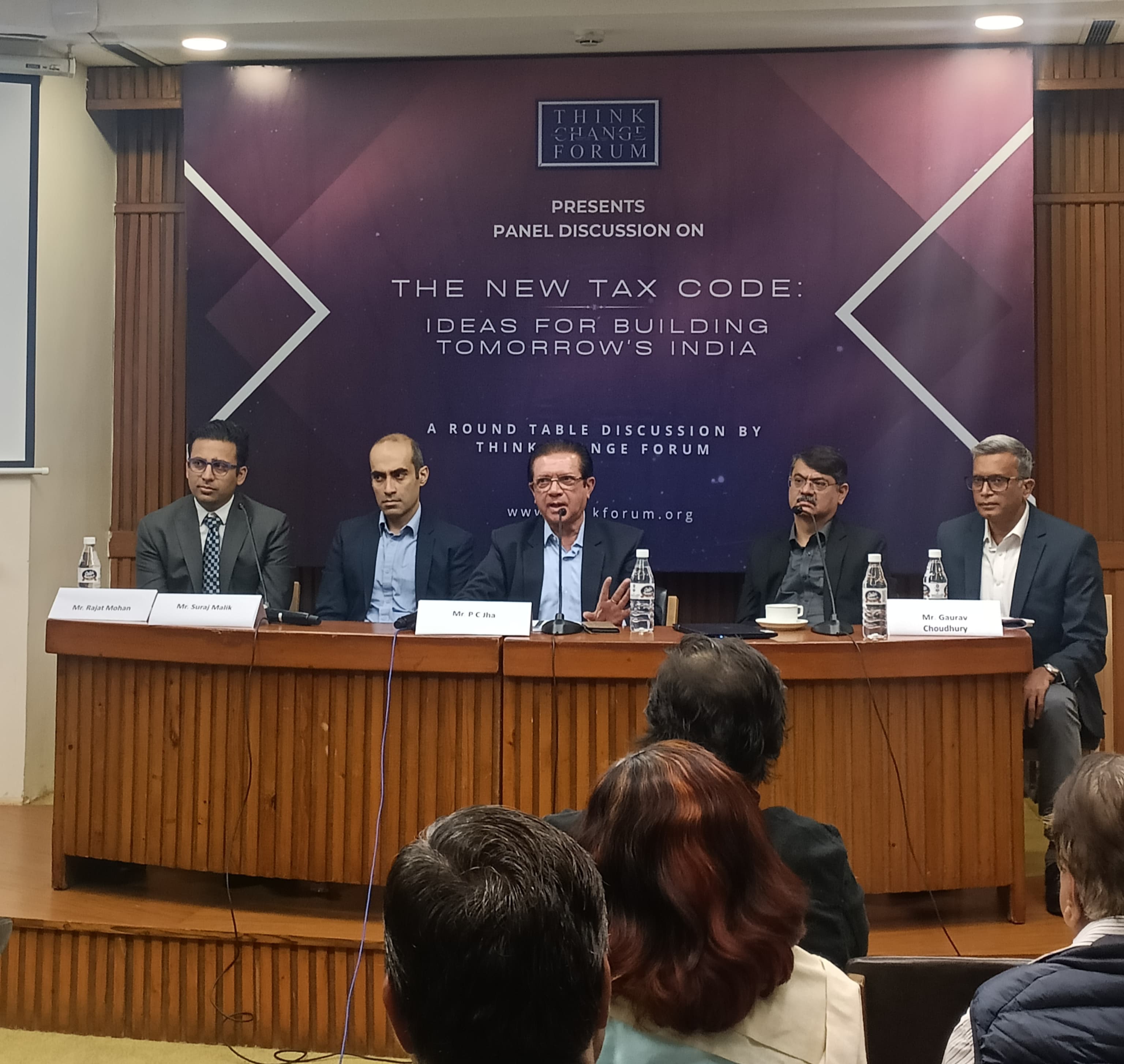November 27, 2024, New Delhi
A distinguished panel at the event:
- Rajat Mohan: Senior Partner, AMRG & Associates
- PC Jha: Former Chairman, Central Board of Indirect Taxes and Customs
- Rajiv Chugh: Partner and Leader - Policy Advisory & Speciality Services, Ernst & Young LLP
- Suraj Malik: Managing Partner, Legacy Growth
Thinks Change Forum through a well-organized seminar “The New Tax Code: Ideas for building tomorrow’s India” with an esteemed panel touched upon various critical issues related to taxation. The discussions covered the widest areas in terms of taxation and related laws. The panel shed light on the mindset of the planners which included increasing tax rates, widening the tax base and enhancing compliance.
Also, the new philosophy of F.L.A.T with Fewer and Lower Rates, Litigation reduction, all-inclusive wider base and tax collection without holding it were some of the related topics which were discussed by the panel at the seminar.
The panellists at the seminar were of the view that by increasing the net tax revenues economy will be energized this will facilitate the vision of a Vikshit Bharat by 2047.
The panellist also discussed that both the direct and indirect taxes must have fewer slabs, lower peak rates; do away with withholding tax; reduce reliance on litigation for meeting targets.
One of the eminent panellists Mr. PC Jha, Former Chairman, Central Board of Indirect Taxes and Customs was of the view that it is certainly not a good situation to have so many tax rates under GST. Ideally, GST should be one tax rate, but in our country, it is not possible to have one tax rate. He suggested that having three tax rates can be relooked at, and instead of 12% and 18%, there can be a single rate of 16%.
Another esteemed panellist Mr. Rajiv Chugh, Partner and Leader - Policy Advisory & Speciality Services, Ernst & Young LLP supported the need to simplify the current provisions in the taxation system, he was of the view that reduction in tax rates will lead to rise in disposable income in hands of citizens and companies will also be able to spend more, if it is rationalized, it can lead to a booming economy.
One of the panellists at the seminar Mr. Rajat Mohan, Senior Partner, AMRG & Associates, said that there is a significant reliance on litigation-based revenues for tax departments to target, although the success rate of government in tax litigation cases is dismal, this situation needs to be relooked at.
Mr. Mohan said that the Government loses 50 percent of the litigation cases before they reach the Supreme Court. He further said that for an efficient tax system litigation cases must go down.
One of the well-known panellists at the seminar Mr. Suraj Malik, Managing Partner, Legacy Growth noted that though there have been incremental changes in the tax laws and a lot of ambiguities have gone, there still is a wide gap in International and Indian practices, and foreign investors are looking for consistency in Indian Tax Laws.
Mr. Malik said that the foreign investors are also nowadays looking for consistency in terminologies and they get a little bit spooked when it comes to some of the aspects of our taxation system. Mr. Rajat Mohan highlighted how stability in tax rates is crucial in ensuring viability of small businesses.
Mr Rajat Mohan believed GST was a masterstroke, but after that there were many amendments and changes in the compliances of GST. Mr. Mohan said that rates must be stabilized for the benefit of the small businesses.
Mr. Rajiv Chug one of the esteemed panellists at the seminar believed if the taxes are withheld, government incurs interest cost. He further said that something needs to be done about it. He suggested reduction of rates or putting in an advance tax would improve the situation.
At the seminar the panellists noted that worldwide countries do not have domestic TDS provisions as every citizen there is responsible for discharging their own tax. The panellists further noted that advance tax obligation can be at par with TDS deposition obligation so that government’s cash flow remains unaffected.
The panellists concluded the seminar proceedings with the observation that the government has taken many significant steps to reform the taxation system. The panellists said changes over a medium term and tweaking of tax rates in the short term will go a long way in boosting consumption.

